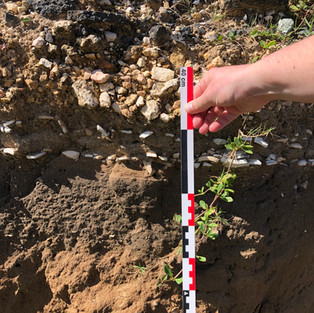We are DUNAS: Descendants United for Nature, Adaptation, and Sustainability
- Climate Science Alliance

- Oct 29, 2020
- 3 min read
Updated: May 8, 2024

By: Alex Warneke, Climate Science Alliance
Puedes leer este blog en español aquí.
At the Northern edge of Puerto Rico, along a secluded stretch of beach, colorful wooden planks rise from the sand. “Lealtad a mi Tierra” (Loyalty to my Land) is artfully scrawled across the flat face of one of roughly fifty or so similarly placed sentinels, each with their own steadfast message to proclaim. But what are they doing here?
In September 2017, Hurricanes Irma and María devastated Puerto Rico causing considerable impacts to both natural and human communities. For this Caribbean island, the ramifications of global climate change continue to be visceral and imminent — however, Puerto Rico’s is not a story of desperation but of resilience. This is the story of DUNAS.

In collaboration with archaeologist Dr. Isabel Rivera-Collazo, the Climate Science Alliance (CSA), Para la Naturaleza (PLN), and other dedicated groups on the ground convened for the DUNAS project — Descendientes Unidos por la Naturaleza, la Adaptación y la Sostenibilidad* — to restore the critical coastal dunes in northern Puerto Rico that were severely degraded by the hurricanes. At their peak efficiency, dunes act as a buffer against rising seas and harsh storm action - protecting the human communities that rely on them. However, due to severe habitat degradation, urbanization, and increasing climatic threats along coastal Puerto Rico, this key ecosystem service has been threatened. On this tiny stretch of beach, maintaining the dunes is one of the few solutions to climate resilience.
Beyond protecting the natural ecosystems through restoration, DUNAS represents something much deeper. Hidden beneath the sand, well beyond the depths of the wooden planks, are lessons and stories from years long past critical to the very identity of the island. The dunes simultaneously safeguard artifacts and numerous areas of cultural significance. Dr. Isabel Rivera-Collazo and her team are working feverishly to document as much of this archeological record as possible before the seas rise and all is lost. By working with ecologists and climate experts to mitigate coastal dune erosion, the team buys time to document and learn from the communities of the past about how they adapted to similar climate scenarios. Dr. Isabel Rivera-Collazo reflects on the work she is doing with DUNAS and across the region, “What I have learned through archeology, is that we are stronger than we think.” From this perspective, protecting the dunes means protecting the very heritage of Puerto Rico.
Back on the beach, the wooden slats represent a simple solution to a complex problem. Each of the pieces works in concert to mimic the plants that would normally be found here if not for severe habitat degradation. The slats - remnants of recycled, broken down cargo pallets - act as a sand catchment system and help to stabilize and re-build the dunes until they are big enough to restore with native plant species.
The success of this project lies beyond the significant sand accumulation that has occurred over the past few months and the stories protected by the archaeological teams on the ground, but rather in the communities that are making it happen. Adjacent to the restored dunes reside the communities of Manatí and Vega Baja. Along with several community organizations, individuals from these communities were the ones trained to create and implement the entire restoration. Like the wooden slats themselves, they work together to maintain the dunes using this colorful solution to their own climate resilience. They are the Descendientes Unidos por la Naturaleza, la Adaptación y la Sostenibilidad. They are DUNAS.

*Descendants United for Nature, Adaptation, and Sustainability

This project was made possible through a 2018 Climate Adaptation Fund grant from the Wildlife Conservation Society (WCS) entitled, “Puerto Rico se Levanta: Learning from extreme events to build and sustain a resilient future". Support to establish the Climate Adaptation Fund was provided by a grant to the WCS from the Doris Duke Charitable Foundation.
























